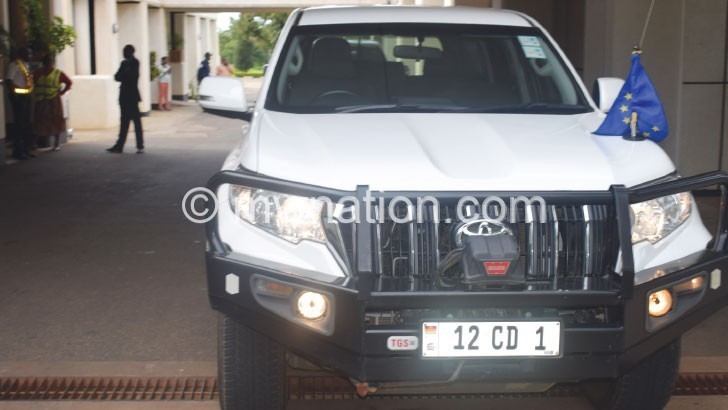EU team shelves Election report
Intense resistance from some quarters, including Malawi Law Society (MLS) and two of the presidential candidates, have forced the European Union (EU) Election Observation Mission (EOM) to shelve release of its May 21 2019 Tripartite Elections final report.
Barely 24 hours after UTM Party president Saulos Chilima snubbed a planned meeting with the EU EOM, Malawi Congress Party (MCP) president Lazarus Chakwera followed suit before MLS backed the duo’s concerns that the presentation was ill-timed given that the Constitutional Court is preparing its judgement in the presidential elections nullification petition case.

The duo, MLS and other commentators asked the EU to suspend the release of its final report to avoid influencing the outcome of the case heard by a five-judge panel of the High Court of Malawi.
In a statement released yesterday after an emergency meeting in Lilongwe, the EU EOM, which arrived through Kamuzu International Airport at 4pm yesterday, said the report would “neither be shared nor published until after the court decision on the elections”.
Reads the statement: “What counts at this time is that all actors remain calm and respect the ongoing legal process before the High Court.”
The mission pleaded with Malawians to regard it positively, saying: “Like the [election] observation in the country between 4 April and 16 June 2019, the visit aims to be a positive contribution to ongoing processes, notably through a set of recommendations in view of possible future reinforcement of electoral processes in the country.”
In its letter addressed to the EU-EOM head of delegation but under the attention of Aurelie Valtat, who is EU deputy head of mission and head of the political and media office in Malawi, MLS asked the mission to defer presentation of the report until the court settles the case to avoid inciting violence in the event that the report’s findings were contrary to expectations of some quarters and the court judgement does not support the same.
The letter, signed by MLS president Burton Mhango and copied to President Peter Mutharika, Chilima, Chakwera and Malawi Electoral Commission (MEC) chairperson Jane Ansah, observes that the mission was aware of the volatile situation prevailing post May 21, 2019 polls and releasing the report “risks falling foul of the sub-judice rule”.
Reads the letter in part: “As you may be aware, dispute resolution is a final part of an electoral process. That case is now at an advanced stage and judgement is awaited with bated breath and significant public interest across the nation.
“The society considers that in the event that your report indicates findings that are contrary to the expectations of some quarters and/or the judgement of the court does not support the findings of the Observer Mission, there is potential that this might incite violence.
“The society believes that the Observer Mission or indeed the European Union would not want to be associated with any failure to promote rule of law at any point in time.”
While advising the mission against any intended release of the report, MLS highlights that under Section 103 of the Presidential and Parliamentary Elections Act (PPEA), “…international observation ends with the determination of the national result or the settlement thereafter of all election disputes”.
In a telephone interview yesterday, MCP secretary general Eisenhower Mkaka said Chakwera called the EU Delegation to Malawi and communicated that he would not meet the EU EOM in view of the pending court case.
On Tuesday evening, Chilima wrote the EU Delegation to Malawi and expressed reservations with the timing of the presentation in view of the pending judgement where he is the first petitioner and Chakwera is the second petitioner.
He said: “It must be obvious to both the [EU] Delegation and the mission that comprehensive reports on the tripartite elections must be avoided in light of the litigation that has since ensued.
“I decline the meeting with the mission. Secondly, I request that the mission calls off presentation of the report until judgement in the case I have referred to. This is the only decent and reasonable thing to do.”
But speaking to The Nation on Tuesday evening in reaction to Chilima’s letter, Valtat said the arrival of the mission was normal and routine.
She said: “That’s a standard return mission and we will not make a statement until they are here. This is not unique to Malawi.”
In separate interviews yesterday, a peace and security analyst and peace building process specialist also described the timing by the mission as against the spirit of peace building as it has the potential to incite violence in the country.
“I call upon all media houses, political parties, faith based organisations, civil society organisations, including the National Initiative for Civic Education [Nice] Trust which is supported by EU, Government of Malawi, Malawians and other development partners to reject the report outright,” said Master Dicks Mfune, a University of Malawi (Unima) social scientist and specialist in peace building process.
He said the EU report looks like “a screen saver” for the sake of the mission’s integrity in terms of peace building after missing its timeline.
On his part, security and peace building expert Alex Chisiano wondered why it has taken the team eight months to release its report.
He said: “The EU report raises suspicion because it should have come out as quickly as possible. You never know it may have been useful as part of evidence to the parties that were in court.”
The EU EOM had 83 observers at 342 polling stations across 120 of the country’s 193 parliamentary constituencies in 27 of the 28 districts during the elections, but released a preliminary statement on May 23 2019, four days before MEC announced the official presidential election results. After the elections, the EU, Commonwealth, Southern Africa Development Community (Sadc) and other foreign observer missions largely stated in the aftermath of the disputed elections that the country’s sixth post-independence general elections were free, fair and credible.





